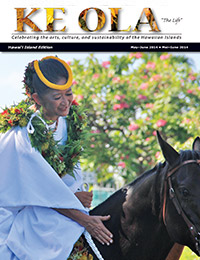Managing with Aloha: Lōkahi
 Lōkahi: the value of harmony and unity. The value of teamwork—collaboration and cooperation. Harmony and unity—people who work together can achieve more. Ninth in an ongoing series.
Lōkahi: the value of harmony and unity. The value of teamwork—collaboration and cooperation. Harmony and unity—people who work together can achieve more. Ninth in an ongoing series.
By Rosa Say
When I was young, my family bought a 21-foot fishing boat. As much as I grew up the local girl who adored going fishing, my preferences were standing thigh deep at a shoreline ‘oama (young goatfish) run with a bamboo pole, or whipping for pāpio (young ulua) from the rocks with rod and reel.
Never having been much of a swimmer, I had my reservations about that boat, for 21 feet of floating fiberglass is nowhere near substantial enough for me when bobbing up and down rolling swells in the Pacific Ocean. So to secure my buy-in and get me to feel more comfortable with her, my family said I could name the boat, giving her a name with the kaona, or deeper meaning, that would make me feel I could enjoy her in harmony with the ocean.
The word harmony was one that appealed to me, for never would I hope to have a greater power than that of the sea. Never would I dare to think that I could somehow control her; I just wanted it to be okay with her that I was part of some pirate crew using this boat to share her fish. We weren’t there to struggle with the ocean or dishonor her; we just wanted to respectfully ask her for some food and go get it without disturbing anything else in her domain. We wanted to coexist.
I named the boat Lōkahi, learning at the time that Lōkahi meant the harmony of being in agreement. On my quest for this name I was taught that mana‘o lōkahi meant unanimous, and ho‘olōkahi meant to bring about unity, to make things peaceful and harmonious. I decided that if I would always have a demeanor of ho‘olōkahi while in our boat the ocean would sense my mana‘o, my respect, and seek to be peaceful for me. She would believe my intent to only fish for what we needed and no more. I suppose you could call it the power of belief, for from the time of her christening forward I always felt completely safe on that boat; I always felt she protected me, and she did. We were a team—me, Lōkahi, and the ocean.

Our fishing boat has long since been retired, after helping us bring much fresh fish to our table. However Lōkahi is still with me, and still all about harmony, and bringing things and people to agreement. I’ve learned even more about Lōkahi as a value that can drive people to better performance; Lōkahi is a value-driver of teamwork in pursuit of synergy. More hands make the work much more pleasant and they move it along faster. In Lōkahi we learn to cooperate with each other, to strive together until we become one in our efforts; it helps us experience work that feels better when we do it harmoniously.
Team is a noun, an objective, and should you choose it, the ‘Ohana in Business can be a higher evolution of a team for you, a concept of more intimacy and greater expectations. With Lōkahi we think of teamwork as active verb, focusing on the behavior of those within the ‘Ohana—how do they interact, how do they work together to effectively get things done? Striving for the Lōkahi of harmony becomes our goal, with the basic premise that groups of people who work together will achieve far more if they seek collaboration and cooperation agreement and ultimately unity. Just as I wasn’t about to struggle against the greater power of the ocean, there cannot be any power struggle when it comes to great teamwork.
That being said, I do think the word “power” gets a bum rap sometimes. Harnessed power can be a pretty wonderful thing—a good force. For example, think about the generative power of medicine and the healing arts. Think about the bountiful electrical power entire cities receive, harnessed from the immense power of water, wind and sun.
When it comes to people, we are better off thinking of power as influence and effectiveness, and how you harness it for good results in productivity, or in searching for the best solution of several options presented in problem solving. We each have the individual power to choose win-win agreements, and seek them.
By virtue of the inherent goodness in universal values that appeal to the humanity of our kind, Lōkahi becomes a wonderful tenet for the managers who seek to coach their performers to their best achievement within the framework of any ‘Ohana in business. Lōkahi sets a proper climate and tone for the expectations of teamwork, for it teaches those involved to pursue the cumulative effect they can have when they harness their individual power and join forces in collaboration, cooperation, alignment, and unity. ❖
Next issue: Kākou, the value of inclusiveness and the ‘Language of We.’
Contact writer Rosa Say: RosaSay.com, ManagingWithAloha.com


